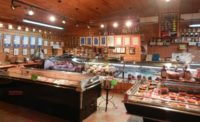(Photo by Phillip Davis, ©2020 Heifer International)
The ramifications of the Coronavirus pandemic have reached far and wide in the meat and poultry processing industry. The virus has caused many large packing plants to shut down for periods of time, and the resulting closures led to problems in the production side as well. Pig farmers in particular have been stuck with animals who are ready for slaughter, but they cannot find a facility to take them. Groups like the National Pork Producers Council have called for legislative relief to assist the farmers who have in some cases been forced to euthanize their animals.
The situation is dire in many parts of the agriculture sector. However, there are some bright spots in the production side of the industry. Small farmers are finding ways to reach consumers, and small processors are providing them opportunities by providing timely processing and high-quality products.
Cypress Valley Meat Co. has facilities in Pottsville, Vilonia and Clinton, Ark. Between all of its facilities, CEO Andy Shaw says that the company can process large animals – both federally inspected and custom exempt – poultry and wild game.
“We are exclusively a services company. We pride ourselves in being a strategic partner for the farmer,” says CEO Andy Shaw. The company had operated a small retail location prior to the pandemic, but its primary business is helping small farmers get high-quality products that they can sell.
“We had a backlog of business coming into this,” Shaw says of the company’s business prior to the pandemic. “Every now and then, you have some cancellations, when someone decides to take their animal to the sale barn. But it was pretty stabilized on what we had expected to come in.
“All that dried up. Nobody canceled anything at all; everybody was bringing in everything they could possibly get and were begging for more. Our backlog just blew up,” he adds.
Cypress Valley works with about 900 farmers to process beef, pigs or poultry. Those farmers then take those products and find distribution channels for them, either through foodservice distribution, farmers’ markets or e-commerce. Some farmers were able to continue their business relatively interrupted, or with a significant uptick in business. Those companies that sold to local restaurants ran into the same problems that all foodservice distributors faced – their customers all shut down overnight. However, even those companies were able to find new business models within a week.
“I don’t know a single person who at this point has been affected negatively. I think most everyone has seen some type of increase, either a decent bump or a substantial increase in business,” Shaw notes.
Shaw was able to keep his 90 employees safe throughout the pandemic through open communication. He promotes full transparency with his employees, from financials to employee safety, and the team adapted to staggered shifts and work hours to increase social distancing. He also offered incentives if they practiced safety measures away from the workplace, too.
As a result of the work Cypress Meat and its customers have done, people in Arkansas and elsewhere have found alternatives to the traditional grocery store model.
“Some people buy meat from a new service and had a great experience, and it exposes that customer to a whole new product that they wouldn’t have had otherwise,” Shaw says. “I see an opportunity to decentralize the meat supply by buying it local. This has advanced the niche food industry by 10 years.”




Report Abusive Comment